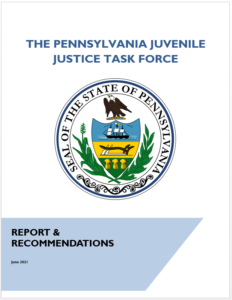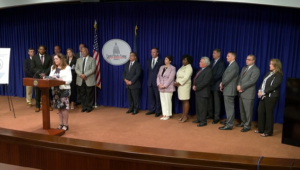

Recommendations highlight data-driven policies and practices to protect community safety and create better paths for youth and families
HARRISBURG – The inter-branch and bipartisan Pennsylvania Juvenile Justice Task Force released a comprehensive final report with policy recommendations that protect public safety, increase accountability, achieve savings for reinvestment, and improve outcomes for youth, families, and communities.
If enacted together, the task force’s policy recommendations will safely reduce the population of young people in out-of-home facilities by 39% by 2026, compared to projections for the population with no policy changes, freeing up nearly $81 million in averted state costs over five years. The task force recommends that these averted costs be invested to support a range of priority areas, including high-quality, nonresidential services across the Commonwealth, increased oversight, and restitution funds.
The task force, co-chaired by Sen. Lisa Baker, Sen. Jay Costa, Rep. Tarah Toohil, and Rep. Mike Zabel, conducted a data-driven assessment of the juvenile justice system, gathered stakeholder input, and developed recommendations that will now serve as the foundation for statutory, budgetary, and administrative changes for consideration during the 2021-2022 regular session of the General Assembly. Democratic and Republican leaders from the three branches of government jointly established the task force in 2019, including Governor Tom Wolf, Supreme Court Chief Justice Thomas Saylor, House Speaker Bryan Cutler, Senate President Pro Tempore Jake Corman, and Senate Minority Leader Costa.
The leaders invited CJI, in partnership with The Pew Charitable Trusts, to provide technical assistance to the task force.

Task force members at the June 22, 2021 press conference.
“We’re impressed with this task force’s commitment to young people in Pennsylvania,” said Margot Isman, deputy director at CJI. “The task force engaged more than 550 community stakeholders, many of whom were young people. We’re glad that those voices, coupled with CJI’s data analysis from three state agencies, could provide the task force what it needed for substantial recommendations that include all parts of the juvenile justice system. Their recommendations, if enacted, will measurably improve Pennsylvania’s youth justice system.”
The task force’s 35 recommendations highlight data-driven policies and practices to protect community safety and create better paths for youth and families, including to:
- Strengthen due process and procedural safeguards
- Focus costly out-of-home placement resources on young people who pose a threat to community safety, while more consistently diverting young people with low-level cases to community-based interventions
- Invest averted costs from reduced reliance on out-of-home placement into expanding the continuum of nonresidential programs to divert kids from juvenile court and from placement; strengthening system oversight; and filling victim restitution funds, among other priorities
- Prioritize restitution payments to victims and prevent unnecessary system involvement by eliminating the imposition of fines and most court fees and costs
- Ensure that young people who have completed their obligations to the court are not held back from successful transition into adulthood by records of juvenile justice system involvement
- Improve oversight to ensure that every young person placed in the custody of the Commonwealth is safe, treated fairly, and receives a quality education
- Narrow the criteria for trying young people as adults in criminal court
- Increase system accountability and address inequities through enhanced data reporting and wider representation on oversight bodies